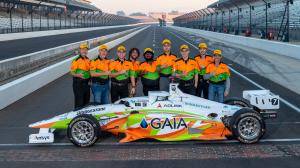VNR: UH competing for $1M in Indy driverless car race
University of HawaiʻiLink to video and sound (details below): https://bit.ly/3G6nvkq
WHAT: The University of Hawaiʻi will compete against the world’s best in the first ever autonomous car racing event. The Indy Autonomous Challenge competition at the Indianapolis Motor Speedway is just like any other car racing competition, minus the need for anyone behind the wheel.
The race is 20 laps with a goal of crossing the finish line in 25 minutes or less, which requires an average speed of 120 miles per hour. The first place team will win $1 million, second takes home $250,000 and third place will earn $50,000.
WHO: UH’s team, UH AI Racing Tech, was established through a UH Maui College course in spring 2020 on autonomous vehicle technology. Gary Passon, the course’s instructor, teamed up with UH Mānoa’s College of Engineering to provide additional expertise and give students a hands-on learning experience.
HOW: In autonomous car racing, the driver in each car is replaced with a variety of sensors that act as the eyes and ears of the vehicle, and a powerful computer to perform the many path planning, tactical and strategic decisions needed to provide the maximum performance from the vehicle. The system is an example of artificial intelligence, which requires engineers to create algorithms to program the car to generate human-like behaviors and interpret complex sensor data.
WHEN: October 23 at the Indianapolis Motor Speedway. The race will be live streamed on the Indy Autonomous Challenge website and on Twitch @IndyAChallenge. Coverage begins at 7 a.m. (Hawaiʻi Standard Time) with the race getting underway at 7:30 a.m.
Additional details:
-
UH qualified for the race through an extensive process including a test run of its software in an advanced simulator system against other teams in May 2021.
-
One of the primary objectives of autonomous car racing is the emphasis on safety.
-
Passon said programming cars to travel at speeds of up to 200 miles per hour in a safe manner will make it easier for companies to program autonomous cars to travel on regular roadways.
-
UH is one of 10 international and U.S.-based teams competing, which include the Massachusetts Institute of Technology, Korea Advanced Institute of Science and Technology and Auburn University.
VIDEO BROLL: (1:53)
0:00-0:42 - the final autonomous car
0:42-1:53 - working on the autonomous car before the final “wrap” is placed on the car
SOUNDBITES:
Lillian Shibata, UH AI Racing Team member and UH Mānoa mechanical engineering junior
(0:11)
“When you think of a car, you think of a driver. But with an autonomous car, we do not have a driver. It’s completely, no driver, only sensors, and the machines on the car itself.”
(0:11)
“What all of us on the team are hoping to achieve is just really gaining the valuable experience from this because being one of the top 10 teams for this race, it’s a really big deal.”


